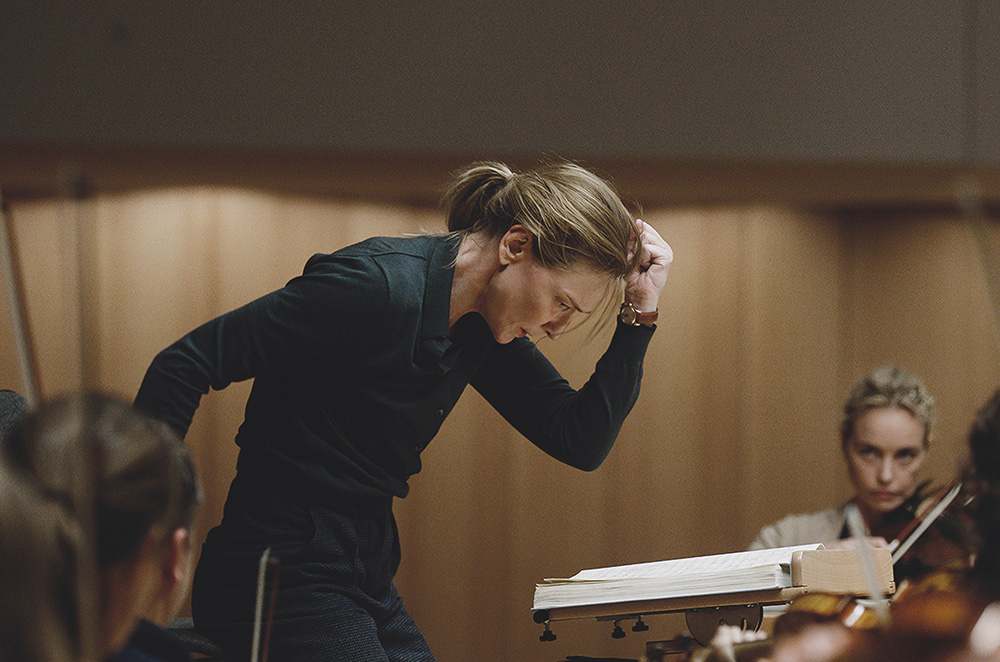Todd Field’s Tár stars an insanely glorious Cate Blanchett – if she doesn’t win an Oscar I’ll eat my hat – as a world-famous orchestral conductor about to record Mahler’s Fifth Symphony. There is also Elgar’s Cello Concerto in this film, and a bit of Bach, but it’s not about music. To say it’s about music would be like saying Citizen Kane is about tobogganing. It’s about power: how you attain it, what you do with it. We enter the world of cancel culture and identity politics and address that old chestnut: can you separate art and artist? It’s basically everything you are certain will bore you to death, but it doesn’t here. It’s riveting. The film is 157 minutes long and doesn’t drag for a single second.
Field wrote this for Blanchett, who commands every frame, as befits a character fully in command of her life, at least at the outset. She is Lydia Tár, chief conductor of the Berlin Philharmonic, philanthropist, teacher, composer, winner of multiple awards, writer of a forthcoming coffee-table book, Tár on Tár.
The film opens with her being interviewed on stage by Adam Gopnik of the New Yorker (played by Adam Gopnik of the New Yorker). She has firm views about gender bias, telling him she has no wish to be called ‘maestra’ instead of ‘maestro’ because ‘we don’t call astronauts astronettes’ and as a woman in this industry ‘I have no complaints.’
The film is 157 minutes long and doesn’t drag for a single second
Her wardrobe is exquisite: bespoke suits and expensive linen or cashmere in tasteful neutral colours. She has a wife, Sharon (the masterful Nina Hoss, unless that should be mistressful?). Sharon is the orchestra’s concertmaster and the apartment they share with their young daughter in Berlin could be an art gallery. Her jets are private and her sleek car is a Tesla or similar (I don’t really know about cars). Her life looks beautiful which is just how she wants it to look.
But Field plants small seeds of doubt. We see that someone is sending snide texts about her on their phone but we don’t know whose phone it is. Why does her assistant, Francesca (Noémie Merlant, also mistressful), often glance at her so wearily? The devil is truly in the detail here. Tár compliments a young woman on her handbag. Watch for the progress of that handbag.
This all starts coming to the boil when she is teaching at Julliard and a student says he doesn’t listen to Bach because he doesn’t listen to dead old white fellas who were misogynists. Tár eviscerates him – ‘your soul has been constructed by social media’ – so he calls her a ‘bitch’ and walks out. But has she won the argument? Or is she just trying to justify her own behaviour? We learn that a former protégée, Krista, has committed suicide. If she didn’t play a part in that, why is she suddenly deleting emails? Has she sabotaged Francesca’s career? She manipulates a blind audition so that a pretty young female cellist gets a job; so now there’s a new girl in her cross hairs. Is she a sexual predator? In fact, who is Lydia Tár, really? And if an artist’s identity isn’t important, why has she put everything into constructing hers?
This becomes as tense as a thriller. As dark forces gather, can she hold it together? What are those noises she hears? Why does she keep seeing a recurring pattern? The story is told in long, luxurious takes while we are kept emotionally at a distance. Our job is to observe.
Some have said that the film is ambiguous. But we are invited to judge, and Field very clearly does. As for the ending, it’s not one of those films that just peters out without a resolution. It’s explosive.






Comments